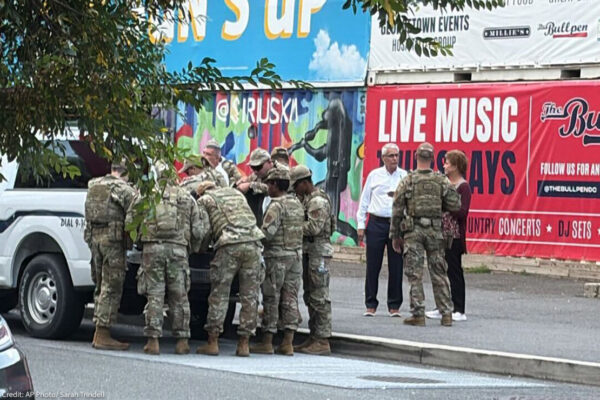Escobar Molina v. Dep’t of Homeland Security – Challenging Warrantless Immigration Arrests Without Probable Cause in D.C.
On September 25, 2025, four Washington, D.C. community members and the national immigration organization CASA sued the Trump administration to end its policy and practice of making immigration arrests in D.C. without a warrant and without probable cause. The plaintiffs are represented by the American Civil Liberties Union of the District of Columbia, American Civil Liberties Union, Amica Center for Immigrants’ Rights, CASA, National Immigration Project, the Washington Lawyers’ Committee for Civil Rights and Urban Affairs, and the law firm of Covington & Burling.
Since August, federal officers from multiple agencies have made hundreds of immigration arrests in the District. The officers frequently patrol and set up checkpoints in neighborhoods where a large number of immigrants live and stop and arrest people as they go about their daily lives.
The law typically requires an agent to have a warrant when arresting someone for an immigration violation. One exception to the warrant requirement is when the agent has probable cause both that a person is in the United States in violation of the law and is likely to escape before a warrant can be obtained.
According to the lawsuit, the Trump administration has a policy and practice of making immigration arrests without a warrant and without an individualized determination of probable cause that the person is in the country unlawfully and that the person is a flight risk.
Each plaintiff in the case was arrested, detained, and released. The lawsuit was filed as a class action. The plaintiffs seek a court ruling to prevent the government from conducting such unlawful arrests against them and others in the future.
On October 3, 2025, Plaintiffs filed a motion for class certification and a motion for a preliminary injunction, to stay agency action, and for provisional class certification to ask the Court to order Defendants and their agents to stop making warrantless immigration arrests without probable cause for flight risk, as required by the Immigration and Nationality Act.
On November 19, 2025, the district court heard oral argument on Plaintiffs’ motions. On December 2, 2025, the district court denied without prejudice Plaintiffs’ motion for class certification and granted in part and denied in part Plaintiffs’ motion for a preliminary injunction, to stay agency action, and for provisional class certification. It issued an order preliminarily enjoining the government from enforcing its policy or practice of making warrantless civil immigration arrests in D.C. without a pre-arrest individualized determination by the arresting agent of probable cause that the person being arrested is likely to escape before a warrant can be obtained. It also provisionally certified a class consisting of “[a]ll persons who, since August 11, 2025, have been or will be arrested in this District for alleged immigration violations without a warrant and without a pre-arrest, individualized assessment of probable cause that the person poses an escape risk” for purposes of the preliminary injunction. The court further ordered the government to document the facts supporting an arresting agent’s probable cause to believe a person is likely to escape before a warrant can be obtained and to periodically provide such documentation to Plaintiffs’ counsel.
On February 19, 2025, Plaintiffs filed a motion to enforce the preliminary injunction, arguing that Defendants are not complying with the preliminary injunction based on the arrest records they produced for warrantless civil immigration arrests in D.C. after the district court’s December 2 order as well as recent public statements made by high-ranking DHS officials on the legal standard for arrests and an internal ICE memorandum that was issued on January 28. The relief Plaintiffs seek includes training for Defendants’ agents on the correct legal standard to apply when making warrantless civil immigration arrests and additional reporting requirements regarding warrantless civil immigration arrests in D.C. The district court has set argument on the motion for March 11 at 10:00AM.





